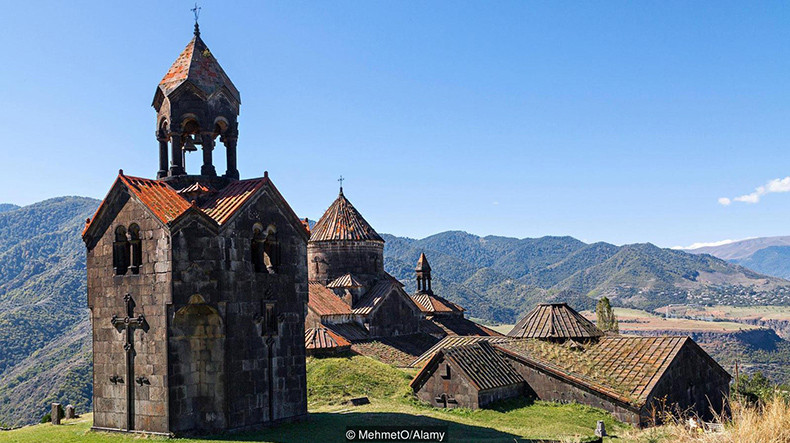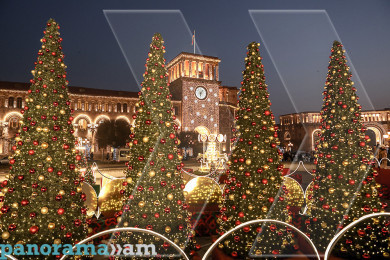
BBC Travel: Why Armenians love strangers
Armenians, like their Caucasus neighbours, have long been renowned for generosity to outsiders – a result of the country’s historical location on the Silk Road, writes Ben Lerwill in BBC Travel, sharing his experience of travelling through Armenia.
Ben Lerwill first stop after crossing the border with Georgia has been Dilijan and the Unesco-listed monasteries of Debed Canyon. “The little town was attractive, slung across slopes cloaked in oak woods. A night here would surely be no hardship. I later learned that in Soviet times Dilijan had earned a reputation as an artists’ retreat, and that its picturesque forested location means it gets referred to as ‘Little Switzerland,’ writes the traveler.
The author tells how he was welcomed by a local resident, a middle-aged lady in an apron, showing hospitality and assistance.
“I was tired, and confused too – I hadn’t expected dinner – but at 7pm I did as I was asked. What was to follow was a heady, hearty, vodka-fuelled evening I simply hadn’t seen coming. In appearing at the requested hour, I found myself swept into a celebration dinner for the 18th birthday of the family’s eldest daughter. My hand was shaken vigorously, my seat pulled out for me. There were 12 of us sat around the table that night, and a noisy bunch we were: Lusine, the daughter in question; a convivial assortment of her nearest and dearest; and one bemused but delighted traveller. The food came in huge portions. The lady that had welcomed me in was Lusine’s mother, and she took charge of affairs. Plates appeared piled high with lavash, the unleavened flatbread that forms the staple of the Armenian larder. There were aubergines and olives, fresh radishes and mounds of stringy cheese. Then came barbequed pork, and greens with garlic. At some point there was a bowl of chopped mushrooms fried with onions, and chicken in an unctuous, spicy sauce. The menu became something of a blur,” telss the traveler and continues: “The reason for this was the oghi, or homemade fruit vodka. Our feast-bearing table was split by gender, with females at one end and males at the other. I gathered, thanks to the English spoken by the birthday girl, that I had an uncle either side of me. Both were jovial and thick-limbed, and took it as their duty to ensure that my shot glass was never dry for a second longer than necessary. Just as the food was brought out liberally, so too was the potent, berry-based firewater.”
The evening ended with bear hugs all round, and linguistically doomed attempts to declare everlasting kinship. The next morning the traveler tries to to leave some money for the previous night’s meal , yet received a stern refusal that he had to back down for fear of causing insult.
“Only then did the extent of the family’s welcome sink in. I was a complete stranger from a country thousands of miles away. I’d turned up at their gate, unannounced, unshaven and barely an hour before a landmark family dinner, yet I’d not just been granted a bed but been ushered into the festivities as naturally and lavishly as if I’d been one of their own. It stretched the definition of ‘guesthouse’ to improbable extremes,” writes Lerwill.
“Armenians, like their Caucasus neighbours, have long been renowned for generosity to outsiders. The country’s location on the historical trade networks of the Silk Road is integral to this. The region has seen the passage of countless thousands of merchants, soldiers, migrants and wayfarers. As long ago as 400BC, the Greek general Xenophon brought his troops this way and gave accounts of tables groaning with lamb, poultry and barley wine,” writes the author adding “The three Caucasus nations – Georgia, Armenia and Azerbaijan – retain a healthy suspicion of each other. There’s a wry Armenian joke that sums it up. A boy asks his grandfather why Armenia hasn't yet sent an astronaut to space. “Because the Georgians would die of envy," the grandfather replies. "And if the Georgians died of envy, then we'd die of pleasure – and the Azeris would be left with all the land." Towards travellers and outsiders, however, local hospitality throughout the region is astonishingly generous,” writes the author.
The author also reminds of the unspeakable pain and hardship Armenia suffered, the Armenian Genocide by the Ottoman Empire as one of them. “Armenia’s national psyche has, inevitably, been shaped by the period. And in so doing, the notion that those who come in peace should be welcomed with open arms has only been strengthened,” says the author adding “I can say this much: when you encounter hospitality in Armenia, you’re unlikely to forget it.”
Newsfeed
Videos






























